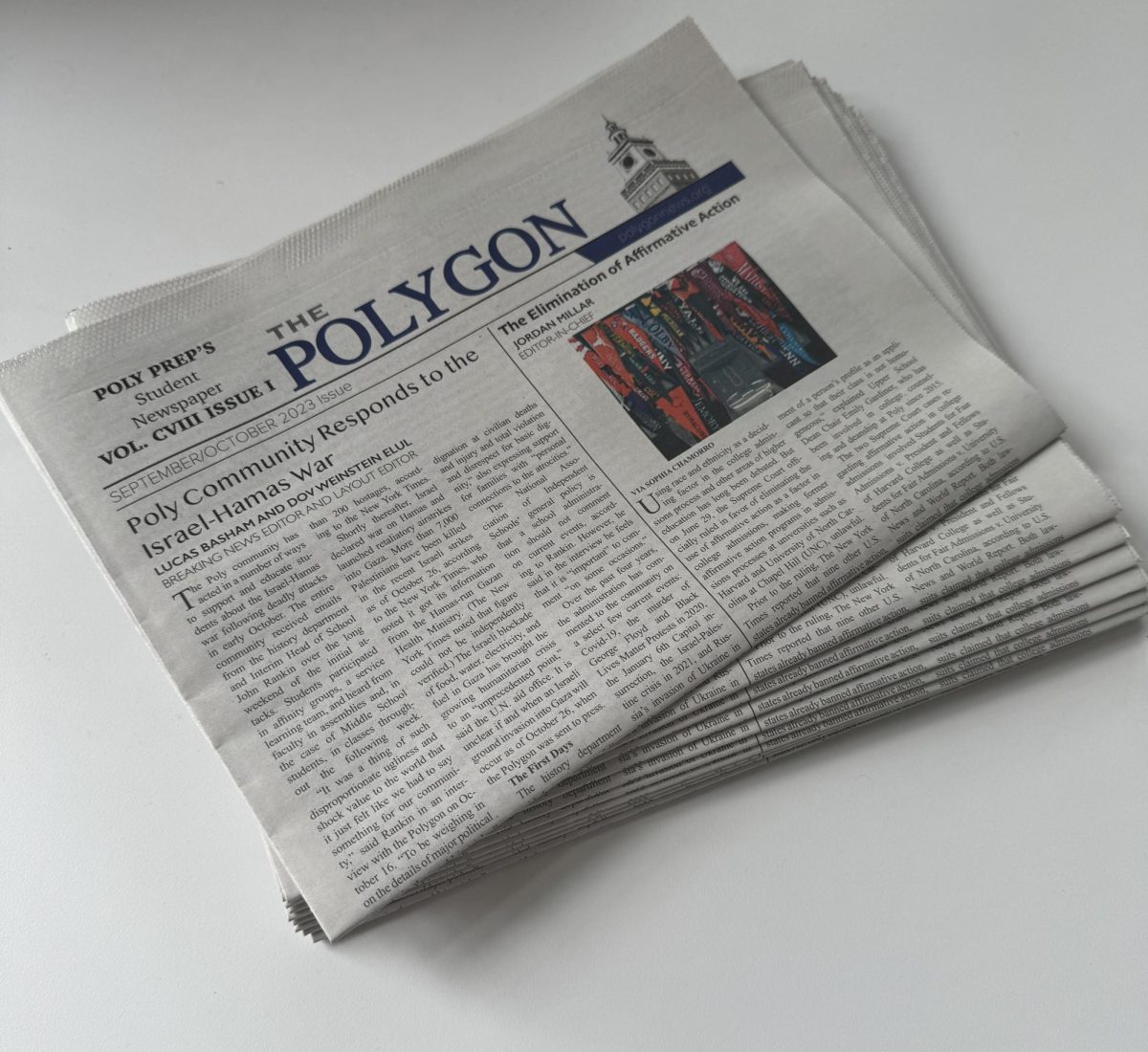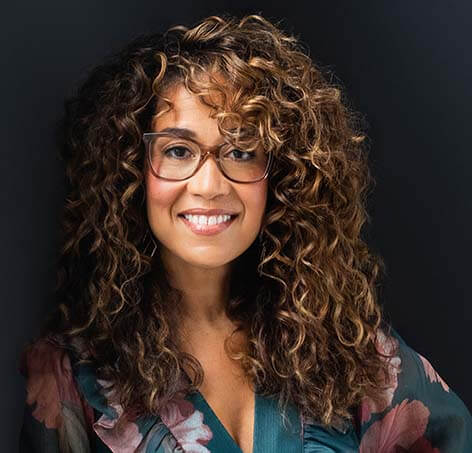The Poly community has acted in a number of ways to support and educate students about the Israel-Hamas war following deadly attacks in early October. The entire community received emails from the history department and Interim Head of School John Rankin over the long weekend of the initial attacks. Students participated in affinity groups, a service learning team, and heard from faculty in assemblies and, in the case of Middle School students, in classes throughout the following week.
“It was a thing of such disproportionate ugliness and shock value to the world that it just felt like we had to say something for our community,” said Rankin in an interview with the Polygon on October 16. “To be weighing in on the details of major political events in the world is tricky.”
Hamas, an Islamic militant organization considered a terrorist group by the United States and the European Union and the formal government of the Gaza Strip, launched a surprise attack in Israel early in the morning of Saturday, October 7, killing more than 1,400 people and taking more than 200 hostages, according to the New York Times.
Shortly thereafter, Israel declared war on Hamas and launched retaliatory airstrikes into Gaza. More than 7,000 Palestinians have been killed in the recent Israeli strikes as of October 26, according to the New York Times, who noted it got its information from the Hamas-run Gazan Health Ministry. (The New York Times noted that figure could not be independently verified.) The Israeli blockade of food, water, electricity, and fuel in Gaza has brought the growing humanitarian crisis to an “unprecedented point,” said the U.N. aid office. It is unclear if and when an Israeli ground invasion into Gaza will occur as of October 26, when the Polygon was sent to press.
The First Days
The history department provided resources to follow coverage and learn about the Israeli-Palestinian conflict’s history in their email to the Poly community on October 8. On Monday, October 9, Rankin sent an email to community members. “As the leader of a school imbued with a certain moral agency, I want to express my disgust and indignation at civilian deaths and injury and total violation and disrespect for basic dignity,” also expressing support for families with “personal connections to the atrocities.”
The National Association of Independent Schools’ general policy is that a school administration should not comment on current events, according to Rankin. However, he said in the interview he feels that it is “important” to comment “on some occasions.”
Over the past four years, the administration has commented to the community on a select few current events: Covid-19, the murder of George Floyd and Black Lives Matter Protests in 2020, the January 6th Capitol insurrection, the Israel-Palestine crisis in 2021, and Russia’s invasion of Ukraine in 2022, according to Head of Upper School Sarah Bates.
Rankin said he alone decided to draft an email as the shocking nature of the events became clearer and President Joe Biden publicly decried the atrocities, as well as after he received messages from numerous parents about the history department’s email. “They felt that the history department’s letter was too neutral,” he said.
Poly’s standard protocol is that the administration and Poly’s communications director get in a room and discuss their response and further actions, but did not do so this time, said Rankin. However, Director of DEIB Erika Freeman, Director of Engagement and Communications Jennifer Slomack, and Assistant Head of School, Academics, Michal Hershkovitz had significant input in his draft of the letter to families.
He noted that the history department followed protocol in its email, which was of similar nature to its letter after Russia’s initial invasion of Ukraine. Early on the day the attacks began, Hershkovitz reached out to Dr. Virginia Dillon, history department chair, asking that the department draft an email. “We wanted to keep a relatively short email with the primary goal of helping our students find information, especially when there is a news event,” said Dillon. “We want to give our students places where they can go to get trusted news.”
“In periods of crisis, there are certain responsibilities that fall to the administration and ultimately to Mr. Rankin,” said Hershkovitz in an interview with the Polygon. “There’s relatively little time in [a] time of crisis because the goal is singular and the goal is very clear: to take care of our students [and] provide them with as much educational support and emotional support as we can.”
Hershkovitz said the administration received both positive and negative feedback from community members to Rankin’s email. “We heard both appreciation for certain messages and pain at the omission of other messages.”
The complexities of the conflict become even harder to address when tackling a student body of fifth to twelfth graders, said Rankin.
In the Middle School, students heard about the news in assembly and participated in affinity groups, according to Head of Middle School Daniel Doughty. Additionally, “when students returned to school on Wednesday, October 10, all 1st-period teachers read a message from me, acknowledging the tragic events and their impact on many families within our community,” said Doughty in an email to the Polygon.
“How to talk about any sort of history in an age appropriate way, a developmentally appropriate way is important,” said Dillon.
Meanwhile, many of the U.S.’s most high-profile colleges and universities found themselves struggling “in a near impossible effort to appease irate activists on both sides of a seemingly intractable issue,” wrote the Wall Street Journal. “The absence of a message can be perceived as a statement in its own right.”
“No one has managed to get this right. No one has managed to satisfy all of the involved constituencies with any one statement … neither did we,” said Hershkovitz. “But it wasn’t because we didn’t care. It wasn’t because we see one group and not another. It wasn’t because we at Poly Prep as teachers are not aware of the complexities of this conflict.”
Horace Mann, another Ivy Prep League School, has also been navigating the conflict. Head of School Dr. Tom Kelly issued a statement condemning hate of any kind, and in an assembly speech he encouraged students to pick solutions not sides, according to Neeva Patel, the Editor-in-Chief of the Record, Horace Mann’s school newspaper. The Jewish Culture Club at Horace Mann also organized an Israel Relief Bake Sale. “Our school normally addresses almost all current events,” said Patel in an email to the Polygon. “However, it was definitely obvious that tensions were high at school and both students and teachers were apprehensive to discuss the conflict.”
Community Responses
In an email sent to Upper School students on Wednesday, October 11, Bates addressed the “wanton disregard for human life.” She asked students to be patient, compassionate, and kind to one another, and noted the spaces available to students: Jewish Caucus, Poly’s affinity group for Jewish-identifying students; MENA, Poly’s affinity group for Middle Eastern and North African-identifying students; an optional after-school student forum; and a history department-led information session on the history of the conflict that was later canceled.
The information session was canceled because they felt they needed more time to prepare. “We didn’t want to present something to the students that wasn’t ready and that could lead to more confusion,” said Dillon. “It’s a really big, really important, and really complicated history.” Dillon said the department is still planning something, but she wasn’t sure when it would be rescheduled or in what format.
Student affinity groups, including Jewish Caucus and MENA, met the same Wednesday as Bates’ email. Jewish Caucus met in the Legacy Gym instead of classrooms in order to accommodate the higher-than-normal attendance.
“Members felt like they had a space to share their questions, thoughts, and emotions which was very important,” said Jewish Caucus student co-leader and senior Hazel Budker in an email statement to the Polygon, also noting that the affinity’s leaders have had several meetings with Poly faculty “to discuss ways that we can best support the students at this time.” (Dov Weinstein-Elul, a co-writer of this piece, is also a co-leader of Jewish Caucus.)
In MENA meetings this month, members also spent time discussing the context of the conflict.
Additionally, Jewish Caucus and MENA students are considering applying for funds from “Poly for Good,” which would go to “a humanitarian organization that specifically helps children [affected by the war],” said Bond. (“Poly for Good” is a new Poly initiative where “students can apply for financial support from Poly for a non-profit service organization they care about,” according to the official description.)
A sub-group of Poly’s Fall Service Learning Team is also working on the curation of two collections of reliable resources for the community, according to Elijah Sivin, director of service learning and history teacher. One collection would be for resources on background information on the conflict, and the other for specific journalists, news outlets, and cultural organizations to stay updated on the war. “This situation has lost considerable amounts of attention, so we want to raise more awareness and educate the Poly community on what’s going on,” said sophomore Noah Pessin, a member of the SLT group, in an email to the Polygon on October 25.
“I’m 40 years old with a PhD [in Middle Eastern Studies] who has studied this conflict for many years and lived in the region and I feel like I have an incredible amount to learn,” said Dr. Max Shmookler, who teaches the Israel-Palestine conflict class at Poly. “So hopefully [that feeling is] some model of how we can all be more open to learning.”
On Friday, October 13, Poly and other Ivy Prep League schools canceled all after school activities and added extra campus security in response to the current head of Hamas’s diaspora office and former chief’s call for a worldwide day of protest. The call heightened tensions and potential for violence in New York City, despite no credible threats, according to the New York Times. The NYPD told Poly that there was an elevated alert, but no evidence of specific threats, according to Rankin. “But out of an abundance of caution, we are canceling all after-school activities,” he wrote in an email to the community.
Director of DEIB Erika Freeman spoke to the Upper School about the war during assembly on Wednesday, October 18. It was the Upper School’s first gathering as a full group since the war had begun. Freeman asked students to think about someone they cared about, and imagine feeling uncertain about their safety. That night, Rankin addressed families over Zoom about the war in his State of the School Address.
Rankin said he was going to meet with families that are a part of the HUGs (Historically Underrepresented Groups) for Jewish Families parent affinity group as well as MENA families, in the October 16 interview.
There are many ways to follow coverage on the war, including on social media. Shmookler and Dillon noted the importance of mindfulness and awareness when it comes to consuming the news on social media. Hershkovitz said that social media often leads to “performative oversimplification and false analogies,” which actively harms both students and adults. “When it comes to such an emotionally-tinged topic like the Israel-Palestine conflict, you have a lot of people who are getting a lot of misinformation,” said Shmookler.
The hashtags #Israel and #Palestine have individually attracted tens of billions of views on TikTok, and more than 50 million posts on the topic have been posted on X. The European Commission formally requested that TikTok, X, and Meta turn over details on efforts to stop the spread of terrorist, violent content and hate speech on their platforms, reported Reuters.
“I think we should all approach this conflict with humility. There’s a lot to know, and we don’t know very much,” said Shmookler. “There are a lot of different experiences and there’s a lot of pain and that pain hurts everyone. And so I think the more humble you can be, the more honest and open you will be to learning.”































